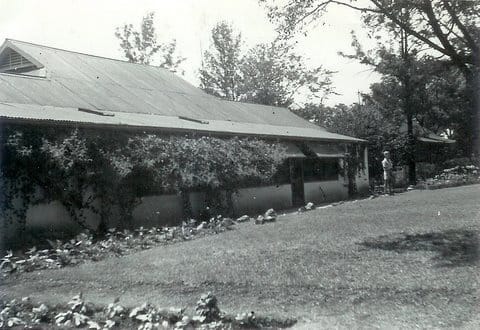Chanukah in Africa

The coral creeper smothering the wrap around verandah of our house. Photo courtesy of Tess (nee Banfield) Harris
Chanukah in Africa
Jews had made their way to Rhodesia in its earliest days, before the turn of the century. Josepth Schattil had come north before the Mafeking to Bulawayo railway was constructed. He could not afford the mule wagon coach service so he walked the 500 miles. Abraham Paul was the baker at the Globe and Phoenix Mine in 1911.
When Rhodes first arrived at Fort Salisbury he was appalled at the lack of development by his BSAC (British South Africa Company), but noted that the Jews were coming. It was a good sign.
Chanukah in Africa
But immigration of any sort was in fact slow. The White community rejected becoming an extension of South Africa in 1923 when it chose self government instead. During WWII immigration from enemy territories was banned. Fear of a flood of European refugees after WWII resulted in the Alien Act of 1946: only10% of immigrants could be aliens. In order that no single minority became powerfully established, citizens of one country could comprise no more than 10% of the foreign quota or 1% of all entries.
So, we were lucky. The Jewish community provided for so many of the town’s needs: Sloman’s from the early 1920’s supplied the Globe and Phoenix Mine and all the small workers. There were also Teperson’s Bakery, Philipson’s Butchery and Paul’s Fruiters.
Still, the Jewish community was so small in 1946 that it could not always make a minyan (a quorum of ten male Jewish adults required for a prayer service). Despite my father’s marriage to a gentile, we were welcomed. This was ‘especially’ special coming after the acrimony from both sides of the family on their marriage. My father’s parents had worn black and mourned for a year. My mother’s mother had a heart attack.
Nevertheless, in 1952 the Jewish Community Hall on Burma Road was opened by Dad with Abraham Paul laying the corner stone.
Chanukah, in Africa when I was growing up, was a simple minor Jewish holiday compared with Rosh Hashanah, Yom Kippur and Passover. Even with the advent of the new Jewish Community Hall, Chanukah didn’t warrant a service. It was celebrated at home.
Chanukah, falling in early December, is close to Christmas. In America, the display of the menorah in the window and the giving of gifts has come to compete with Christmas lights and presents.
But in Rhodesia, the sun is burning brightest, hot enough to melt the candles on a menorah displayed in a window. Our home, in any case, was obscured by a profuse coral creeper clinging to the fly-screened, wrap-around verandah.
Instead, the dining room table was sprinkled with chocolate gelt (coins) wrapped in gold foil. We each had small mesh bags of gelt, and a dreidel (small spinning top) tucked under our serviettes on the first night. Our Chanukah menorah held eight birthday size candles. As my older brother approached his thirteenth birthday Dad made a special effort to get home before sundown to light the candles, one more each night for eight nights, and chant the appropriate prayers in Hebrew at the dinner table. Mom, uncustomarily, for she was no convert, even made a rare effort to make latkes (potato pancakes) symbolically cooked in oil.
Once the meal was underway, Dad would recount the Chanukah story: the only holiday celebrating a military event. One old man, Mattathias, slew the man about to sacrifice a pig, so starting the Jewish revolt that in three years swept the Greeks out of all Judea. The candles symbolized the miracle of one night’s oil lasting for eight nights as the recaptured Temple in Jerusalem was restored.
Why was it important? “It was all about not being afraid of the dark,” Dad said, “We all have the power to strike a match and light up someone’s life, and change the world. Stand up for yourself, your values and beliefs like Mattathias.”
Thanks to Tess (nee Banfield) Harris for photo of the front view of the house at #1 Silver Oaks Road, Que Que, Southern Rhodesia.
